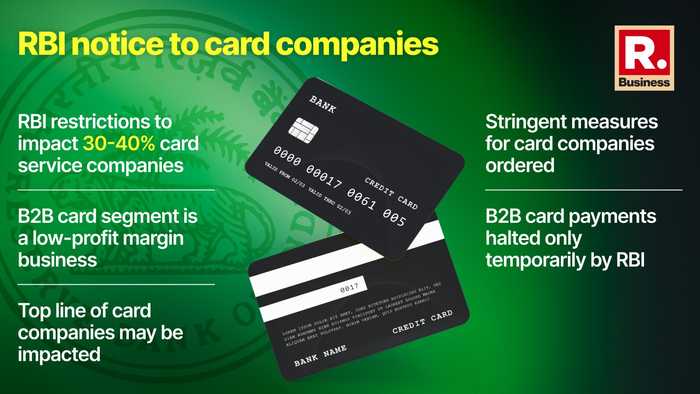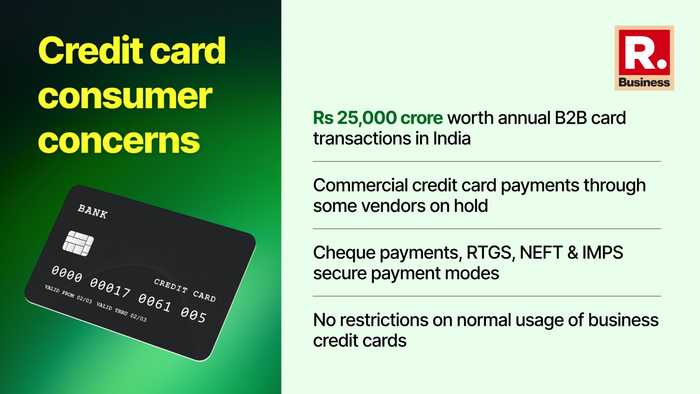Published 18:20 IST, February 17th 2024
Are RBI's restrictions on B2B credit card payments via unverified routes permanent?
RBI restricting card networks from supporting B2B card issuance by non-bank intermediaries could hit the volumes.
- Republic Business
- 3 min read
RBI notice to card companies: The Reserve Bank of India’s (RBI) order restricting card networks from supporting business card issuance by non-bank intermediaries could hit the volume of card spending but will not impact profits in the card business, said a report by Macquarie Capital. The lingering question in the card service industry is, why was this done by the RBI, and whether this would be a permanent ban? Republic Business takes a deep dive.

RBI puts B2B card pay on hold
The entire finance and fintech industry in India was jolted, with a major shockwave earlier this week when the RBI enforced a ban on commercial payments made by corporations using intermediary fintech platforms. A notice was also sent to Visa and Mastercard to restrict such payments, according to media reports.
The RBI restricted B2B payments made by commercial credit cards through Business Payment Solution Providers (BPSPs). Experts say central banks actions on BPSPs that were not meeting their verification norms will have a ripple effect on the volume of transactions facilitated through the card service companies. This will also impact the profits of card companies, financial expert Kishore Subramanian said.
“The commercial card expenditure in terms of volumes will see a dip across all banks. It will go down by 30-45 per cent. The industry average is Rs 25,000 crore a month,” added Subramanian.
Third-party intermediary route
As per the RBI, the card company in question was being routed through commercial payments through third-party intermediaries who didn’t comply with the RBI payment and customer identification norms. So, who are these third-party players and what is the RBI’s directive to card companies?
As per experts, these transactions made by organisations through their credit cards are generally of a lower margin, resulting in low marginal impact.
“The transactions will be low, but the impact on its overall profitability will be low. The RBI most likely will reverse this decision with a lot of conditions that should be met before proceeding further,” Subramanian said.
Corporate credit cards are mostly issued to drive up volume, and they do not contribute to the bottom line of the card companies, said the expert, adding that commercial credit cards were primarily used by corporations to make vendor payments, tax payments, and business expenses.
Normal business credit cards
The central bank has said that commercial payments routed through a third party raised two concerns. One of the issues was that a large amount of funds were being pooled into an account of the intermediary and transactions were being processed without adequate information on who the funds were going to.

The issue arose when the end recipients of the contentious payments were not able to be tracked through their KYCs. Hence, the RBI has to move swiftly and restrict these commercial payments. As per Subramanian, these restrictions seem to be temporary, as the RBI will most likely reverse the ban on B2B commercial card payments, and introduce new and stricter rules that need to be complied with.
“This strict compliance across the board needs to be followed so that the chances of laundering money are reduced significantly. This is the end objective of the RBI,” Subramanian said.
The KYC of all stakeholders in the commercial card service chain will be vetted thoroughly so that fraudulent transactions and unaccounted transactions are prevented. “This strict action by the RBI had to be taken to clean up the system so that corporations do the due diligence financially while making B2B payments and is most likely a temporary one," Subramanian further added.
Updated 18:25 IST, February 17th 2024